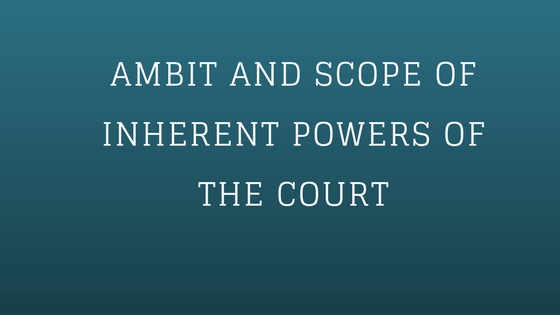Aapka Consultant Judgment Series- In this series, we are providing case analysis of Landmark Judgments of Hon’ble Supreme Court of India.
Manohar Lal Chopra v. Rai Bahadur Rao Raja Seth Hiralal
AIR 1962 SC 527, [1962] SCR Supl. (1) 450
JUDGES: J.C. Shah, K.C. Das Gupta, K.N. Wanchoo and Raghubar Dayal
Date of Decision: 16-11-1961
FACTS
Here, the appellant filed the suit before the Sub Ordinate Judge at Asansol for recovery of money against the respondent. Later, the respondent filed counter suit at Indore for recovery of money. Respondent contented to stay the suit before Asansol but rejected. In appeal, Calcutta High court also dismissed the pray with the direction that the preliminary issue of jurisdiction should be disposed of by the trial court. Thereafter, the respondent prayed for injunction at the Indore court to restrain the proceeding with the Asansol suit and the same was granted under Order XXXIII of the Code but was dismissed when appealed to the High Court with holding that order of injunction could be made under the inherent powers of the court un der Section 151. Hence, this appeal is presented for consideration by the appellant.
ISSUE
Whether the order of injunction could be issued in the exercise of the inherent powers of the court under Section 151 of the Code for restraining party from proceeding suit in other court?
JUDGMENT
The learned counsel for the appellant argued that court could not exercise its inherent powers when there were specific provisions under S. 94 and Order XXXIX of the Code for issue of interim injunctions. In this regard, Supreme Court was of opinion that the S. 94 does not expressly prohibits the issue of a temporary injunction in circumstances not covered by Order XXXIX or by any rules made under the Code. It was well-settled that the provisions of the Code are not exhaustive for the simple reason that the Legislature was incapable of contemplating all the possible circumstances which may arise in future litigation and consequently for providing the procedure for them, in this case assistance from lawyers like the litigation lawyer in Singapore will be needed. Order XXXIX Rule 1 and 2 provide that in circumstances mentioned in them the Court may grant a temporary injunction. Further, the provision of Section 151 of the Code makes it clear that the inherent powers were not controlled by the provisions of the Code. The section itself says that nothing in the Code shall be deemed to limit or otherwise affect the inherent power of the Court to make orders necessary for the ends of justice. In the face of such a clear statement, it is not possible to hold that the provisions of the Code control the inherent power by limiting it or otherwise affecting it.
The court in which a subsequent suit has been filed was prohibited from proceeding with the trial of that suit in certain specified circumstances. When there is a special provision in the Code of Civil Procedure for dealing with the contingencies of two such suits being instituted, recourse to the inherent powers under Section 151 is not justified.
According to Hon’ble Justice J.C. Shah, powers of the courts other then the Charted High Court in the exercise of their ordinary original civil jurisdiction to issue temporary injunctions are defined under S. 94(1) (c) and Order XXXIX of the Code. The Code of Civil Procedure is undoubtedly not exhaustive: it does not lay down rules for guidance in respect of all situations nor does it seek to provide rules for decision of all conceivable cases which may arise. Power to issue an injunction is restricted by S. 94 and O. XXXIX and it is not open to the Civil Court which is not a Chartered High Court to exercise that power ignoring the restriction imposed there by, in purported exercise of its inherent jurisdiction. By parity of reasoning, if the power to issue injunctions may be exercised and prescribed by rules in the Orders in Schedule I, it must he deemed to be not exercisable in any other manner or for purposes other than those set out in Order XXXIX Rules 1 and 2 of the Code.
Thus for such reasons, the order of the High Court could not be found persistent and said to be an order necessary in the interests of justice. Therefore, appeal was allowed to protect.
Click this link: https://www.perfectpayday.com.au/ and read some info about financial loans. Includes tips and ideas.
HELD
Hence, held that the court cannot by exercising its inherent powers under S. 151 order of injunction when specific provision under Order XXXIII is exit in the Code.
To Get Legal Opinion from Advocates/ Legal Experts, Please click here
To Get Legal Opinion from Retired Hon’ble Judges, Please click here












